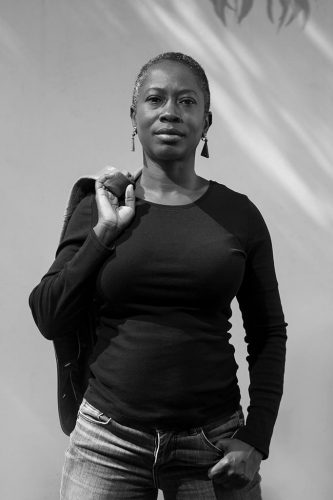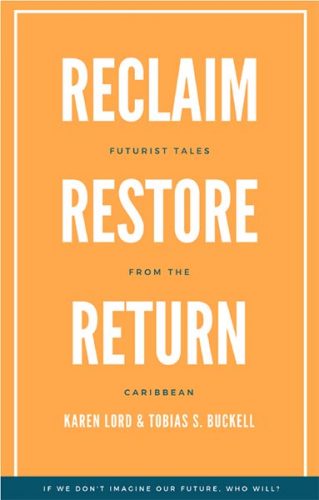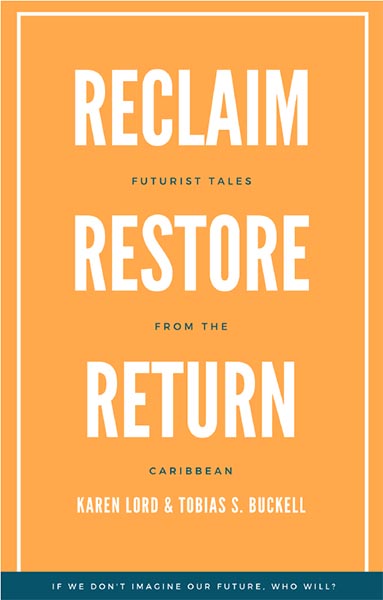Two weekends ago, I scratched something off my bucket list: I attended the Bocas Literature Festival. I was grateful that Bocas decided to keep the show on the road, pandemic or no pandemic, by opting to go fully virtual for its 10th anniversary. Although I was only able to attend on the opening day, I certainly enjoyed myself. September 18th was Future Friday, coincidentally, which introduced audiences to SF/F authors from around the region and the diaspora. I loved watching them gush about each other’s work, while making it clear that science fiction has a place in regional development, restoration and planning.
The most important takeaway from this part of the LitFest for me, therefore, was the e-book anthology published for this year’s festivities. Reclaim, Restore, Return: Futurist Tales from the Caribbean edited by Karen Lord and Tobias S. Buckell, serves as a sort of teaser trailer for Caribbean Science Fiction as a whole and for each of the authors featured in the collection. This collection is a sip, a mere suggestion of rich flavour of our futurist literature aimed at luring you in and enticing you to read more from each of these authors. In my opinion, it’s a great starting point for to the uninitiated in regional science fiction. And the best part of all, it’s available online for the low cost of FREE!
“Caribbean Futurism – not a genre tag like the Afrofuturism of Wakanda and Beyonce, but a practical results-oriented collaboration of literature, science and policy – could be the lever we need to stand firm and move the world.” – Karen Lord, Our Sanctuary Sea.

Storytelling is just one of the purposes of this anthology. As Lord notes in Our Sanctuary Sea, the essay that opens the anthology, each story featured in the collection shows how Caribbean literature, science and policy can each influence each other to help drive the necessary changes that we need within the Region to ensure its survival.
For a moment, think about the way that American science fiction (books, movies and TV series) has influenced technological developments and vice versa. Perhaps you have seen the videos on Facebook of the Boston Dynamics robot dogs or maybe their Parkour Robot. Cute, right? Maybe you have also seen the Black Mirror episode “Metalhead”. Do you remember that chill you felt as you watched it? I certainly do. It is an eerie warning about how technology can get away from us, hurting rather than helping.
Conversely, Black Mirror’s “San Junipero”, “Hang the DJ” and “Striking Vipers” episodes each showcase positive predictions for the future. They’re not entirely utopian, but they do give us a little hope for the future, especially on the interpersonal level.
Lord says it best: whenever science and fiction intersect, they “come together, flint striking iron, to spark new ideas, new stories and new approaches out of old tinder”. These new ideas act as utopian or dystopian interpretations of our present and futures, acting as grim warnings, while rousing us re-examine our lives and our state of living, or inspiring visions of possibilities that could make our lives easier, more accessible, more inclusive and more hopeful. In time, the generations who are influenced by these stories actively work to either make those futures a reality or to prevent the worst from happening.
This anthology, I believe, showcases what the relationship between science and science fiction can look like for the Caribbean. It examines several of our pressing problems – climate change, environmental degradation and restoration, racism and classism, and more – while also suggesting possible solutions and methods of implementation, and also giving us entertaining, heart-felt reads. This combination of emotion and logic collides to make each of these stories memorable, while also acting as an inspiring projection for Caribbean science fiction and the future of our region.
 Science Fiction as Socio-political and Socio-economic commentary
Science Fiction as Socio-political and Socio-economic commentary
Brandon O’Brien’s “fallenangel.dll” and Karen Lord and Tobias Buckell’s co-authored short story “The Mighty Slinger” both deal with socioeconomic and sociopolitical problems in different times and spaces.
“Fallenangel.dll” explores the same idea about robot policing that I mentioned previously, just that in this case, the story is set in a near-future Trinidad in the middle of a government lockdown. The story not only features a political secret, but shows how young, college-age students – UWI students in this case – can be the ones to uncover and expose the root of a problem.
On the other hand, “The Mighty Slinger” blends hard Sci-Fi with the region’s musical tradition by showing how a Calypso band on a cryosleep cycle, could spark an interplanetary socioeconomic revolution with politically charged lyrics set to remixed old island tunes.
Both stories gave me chills, especially “The Mighty Slinger”. While “fallenangel.dll” felt more immediate to me, “The Mighty Slinger”’s audacity to scale up Calypso’s influences and its ability to spark change by taking jabs at the societal elite made my heart sing.
Science Fiction for Climate and Environmental Conservation
Cadwell Turnbull’s “Monsters Come Howling in their Season”, Nalo Hopkinson’s “Repatriation” and Tobias Buckell’s “Category 6” all touch on aspects of climate change and the environmental degradation in the region. But in different ways.
Of the set, “Monsters Come Howling in their Season” was my favourite. It follows a journalist who is back in the US Virgin Islands in the middle of another Category 5 hurricane. It alternates between the protagonist’s memory of 2017, when the protagonist had to flee their home after Hurricane Irma, and the present where the people of the island are better prepared and organised for intense hurricanes. The keys to their success? Common – a opensource benevolent AI – and the region’s dedication to recover from the exploitation of disaster capitalism.
“Repatriation” and “Category 6” tackle the ways the tourism industrial complex has exploited the Caribbean and suggests how its remnants could be repurposed to serve the region and its people, and help to restore the islands.
“Repatriation” follows a Jamaican name named Carlton, whose husband surprises him with a 40th birthday gift that he doesn’t want: a Caribbean cruise. Hopkinson uses the story to pay homage to the Jamaican marine biologist Dr Thomas J. Goreau, who invented a method to help regrow and restore coral reefs and the beaches.
Buckell, on the other hand, goes a different route with an eerie but hopeful prediction of the Caribbean’s post-pandemic future. In “Category 6”, hurricane seasons have become more frequent and destructive, but the region has worked hard to reconsider its priorities and revamp CARICOM so that it can better serve its Member States. Buckell also uses cruise ships, monuments to a bygone era of wanton excess, as a tool that can help the Caribbean rather than aid its destruction.
Science Fiction Exploring the meaning of “Home”
Lastly, H.K. William’s “Cascadura” blends Caribbean cuisine, local folklore and science fiction and natural disasters to explore the Caribbean migrant’s angst about the meaning of home. In this short story, the world’s oldest person is a 275-year-old Trinidadian woman living in New York. Over two centuries prior, her cells stopped aging and developed an unnatural resistance to disease. The reason for her immortality is also the reason that she can never go home again. It’s a sad story that explores immigrant angst: the desire to migrate for opportunities coinciding with the fear that home may not be there one day.
Conclusion
I believe that Reclaim, Restore, Return is a great starter pack to ease into Caribbean sci-fi and speculative fiction. While the stories are brief, they resonate on a frequency that begins in our present, but which radiates out and beyond us into an uncertain future. They each integrate science and technology with issues unique to our region, resulting in a collection that feels more like a lived reality rather than fictional projections of the shape of things to come.
I have two critiques of this collection, however. Firstly, while this anthology reflects the entire region thematically, it doesn’t feature as many authors as I would have hoped. However, like I said, this is just a teaser, and I hope that in the future, there will be a similar, but bigger collection or series of collections which features a bigger cast of SF/F writers. I also hope that in time, stories like the ones in this collection will inspire generations of geeky, nerdy Caribbean children and young people to influence the change that they want to see in the region.
Secondly, I did find at least two of the short stories a bit heavy handed with their themes. For me, a bit of the immersion was lost in this respect as the stories felt a little more like science journalism than science fiction. Nevertheless, I enjoyed them despite this as I understand that it may have been the authors’ intention to make the short stories a tool for both science education and advocacy.
I hope that this collection will inspire our local, regional and diasporic writers, and show them that there’s a market out there for Caribbean speculative fiction, science fiction and fantasy and that there are regional and international audiences waiting patiently to read such creations. I hope that you are as inspired and as excited about this collection as I am, and that you’ll enjoy these fantastic introductions to some more of our regional SF/F authors.

Nikita Blair is a speculative fiction and creative non-fiction writer. Her work has been featured in Moray House’s Ku’wai magazine, The Guyana Annual, the Stabroek Weekend’s Writers’ Room and the Commonwealth Writer’s blog. A collection of her work is featured on her blog, blairviews, where she writes book reviews, essays, and articles on topics of interest. Currently, she is completing her degree in Communications Studies at the University of Guyana, Turkeyen.


